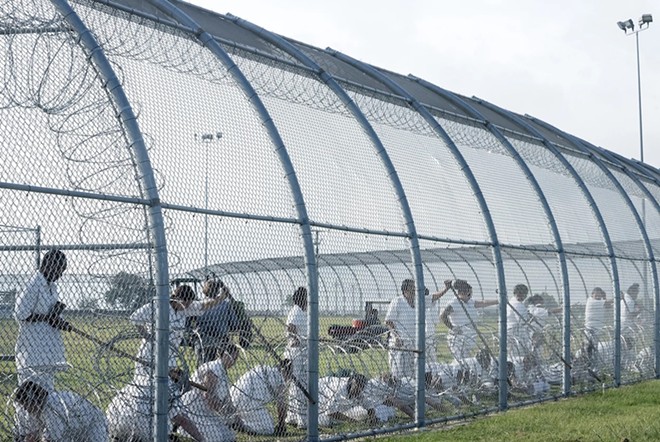
Texas Tribune / Bob Daemmrich
Trustees do work at a Texas girls’s jail.
On a heat November evening, Salia Issa had simply begun her shift as an Abilene jail officer when she felt the extraordinary ache of what she believed was a contraction.
Seven months pregnant, Issa mentioned she rapidly alerted her supervisors. She informed them she wanted to go to the hospital however knew jail coverage wouldn’t enable her to go away her publish till somebody might substitute her.
Nobody got here for hours.
Issa saved calling for reduction, however her supervisor repeatedly refused her, even telling her she was mendacity, in keeping with a federal lawsuit filed towards the Texas Division of Prison Justice and jail officers.
“You simply wish to go house,” the supervisor allegedly informed her.
Finally, two and a half hours after the ache began, the expectant mom mentioned she was allowed to go away the Middleton Unit. As rapidly because the ache would enable her, Issa drove to a close-by hospital, the place medical doctors rushed her into emergency surgical procedure after being unable to discover a fetal heartbeat. The infant was delivered stillborn.
If Issa had gotten to the hospital sooner, medical personnel informed her, the infant would have survived, the lawsuit claims.
Practically a yr later, Issa and her husband, Fiston Rukengeza, on behalf of themselves and their unborn little one, sued TDCJ and three of Issa’s supervisors — Brandy Hooper, Desmond Thompson and Alonzo Hammond. They argue the state precipitated the loss of life of their little one by violating state and federal legal guidelines in addition to the U.S. Structure, and they’re searching for cash to cowl medical prices and funeral bills and to compensate for ache and struggling.
However the jail company and the Texas lawyer normal’s workplace, which has staked its fame on “defending the unborn” all the way in which as much as the U.S. Supreme Courtroom, are arguing the company shouldn’t be held accountable for the stillbirth as a result of workers didn’t break the regulation. Plus, they mentioned, it’s not clear that Issa’s fetus had rights as an individual.
“Simply because a number of statutes outline a person to incorporate an unborn little one doesn’t imply that the Fourteenth Modification does the identical,” the Texas lawyer normal’s workplace wrote in a March footnote, referring to the constitutional proper to life.
For greater than 20 years, in laws handed by lawmakers and defended in court docket by the lawyer normal’s workplace, Texas has insisted “unborn kids” be acknowledged as folks beginning at fertilization. And though it has historically referred to all levels of being pregnant, from fertilized egg to start, as an unborn little one, the state repeatedly referred to Issa’s stillborn child as a fetus in authorized briefings.
It’s a stark shift in tone from the state’s self-proclaimed standing as “a nationwide chief within the safety of the unborn” within the anti-abortion combat. A number of months after Issa misplaced her unborn little one, now-suspended Lawyer Normal Ken Paxton mentioned in a press launch that he would “proceed to combat tirelessly for the rights of the unborn.” Paxton had not but been impeached and was nonetheless on the helm of the company when the state’s motions in Issa’s case had been filed.
The state’s argument depends largely — however not solely — on the timing of the tragedy. Issa misplaced her unborn little one seven months earlier than the Supreme Courtroom overturned Roe v. Wade within the well-known Dobbs choice.
“This Courtroom needn’t weigh into the tough query of whether or not, post-Dobbs, an unborn little one possesses constitutional rights underneath the Fourteenth Modification,” wrote Benjamin Dower, with the lawyer normal’s particular litigation workplace, in a January submitting. “Even when she or he does, that proper was not clearly established on November 15, 2021.”
The change in tune when it’s the state accused of wrongdoing is putting, mentioned Mary Ziegler, a authorized historian centered on abortion and fetal rights at College of California, Davis. She mentioned she didn’t perceive why the state opted to combat the lawsuit as an alternative of taking the chance to say, “We don’t deal with unborn kids like this within the state of Texas.”
“It appears kind of bizarre for the state to say, ‘We’ve spent a long time saying Roe v. Wade was a horrible violation of human rights. However again in 2021, this violation of human rights allowed us to not get this worker reduction,’” she mentioned.
In a court docket response, Issa’s lawyer shot again that the state’s arguments had been “nothing greater than an try and say—with out explicitly saying—that an unborn little one at seven months gestation shouldn’t be an individual.”
The lawyer normal’s workplace didn’t reply to questions for this story. Issa’s lawyer mentioned he and the household had been declining to remark outdoors of authorized filings.
A TDCJ spokesperson mentioned Wednesday that at this early stage within the authorized course of, the company hasn’t had a possibility to current its facet of the story. As a substitute, the state has solely argued towards the validity of Issa’s authorized claims.
In filings to this point, state officers haven’t disputed any of the household’s claims. The company didn’t reply questions on whether or not there was self-discipline for the supervisors or any actions taken by the company after the loss, saying it couldn’t touch upon pending litigation.
Within the months after dropping her little one, Issa first filed an inside discrimination criticism with TDCJ, in keeping with the lawsuit. However after months with none response from the company, she and her husband filed a criticism in federal court docket in October.
Other than violating the unborn little one’s proper to life and bodily integrity, the problem claims TDCJ and the supervisors violated Issa’s fundamental rights and discriminated towards her primarily based on her intercourse and being pregnant. The lawsuit additionally argues TDCJ officers violated the supply of the federal Household and Medical Go away Act that entitles staff to take emergency go away to care for his or her kids.
Represented by the lawyer normal’s workplace, as is the expectation for all state businesses that discover themselves in court docket, TDCJ and Issa’s supervisors are asking a federal choose within the Western District of Texas to toss the lawsuit.
Regardless of selections that “finally resulted in tragic penalties” and supervisorial conduct that was “blunt to the purpose of rudeness,” Dower wrote, the claims don’t show the company or its staff broke the regulation.
Texas prisons are notoriously robust locations to work, and the company is chronically understaffed. Nonetheless, the lawsuit claims there have been at the least three officers accessible to step in for Issa when her medical emergency started. Issa’s supervisors directed them to remain within the jail workplace, Issa mentioned, and the on-duty nurse was by no means known as to take care of her.
Final week, in a preliminary court docket ruling, U.S. Justice of the Peace Choose Susan Hightower advisable that District Choose Alan Albright maintain the case alive, at the least partly. She advised the district choose take up the claims involving discriminatory therapy primarily based on Issa’s being pregnant, rejecting TDCJ’s argument that Issa’s request to go away work “instantly” was unreasonable.
“Issa’s request to go away work to go to the hospital whereas she was seven months pregnant and experiencing a pregnancy-related medical emergency was cheap,” the Justice of the Peace mentioned.
Relating to fetal rights, Hightower mentioned the court docket ought to reject the claims associated to the unborn little one’s proper to life and bodily integrity, however with out weighing in on whether or not a fetus is an individual. As a substitute, she mentioned the declare didn’t clear the constitutional bar in exhibiting the state deliberately precipitated the loss of life of her unborn little one.
Nevertheless, she additionally urged Albright to permit the argument that TDCJ officers violated the FMLA provision that permits staff to go away to care for his or her sons or daughters underneath the age of 18. In that declare, “fetal personhood,” or the concept of a fetus being legally thought-about an individual, is entrance and heart.
Issa and her husband say in court docket filings that she was searching for to go away work as a result of her unborn little one was affected by a critical well being situation, together with a scarcity of oxygen and problem respiratory throughout labor.
“Issa’s unborn little one was previous viability and its heartbeat had beforehand been detected,” the couple’s submitting states. “This overwhelmingly helps discovering the unborn little one to be a ‘son’ or ‘daughter’ given the importance the State of Texas has hooked up to such benchmarks.”
Texas argued that the declare is invalid as a result of Issa was solely searching for go away to look after herself, not a baby. And, they word, she was capable of take go away after the stillbirth.
“The only real grievance is a 2.5-hour delay in granting permission to go away work mid-shift,” the state mentioned.
The state later clarified that it was arguing that the household care provision doesn’t apply to an unborn little one. Ziegler mentioned the inconsistency as to when Texas considers a fetus an individual opens the window to the complexity of fetal personhood claims and motivations.
“Even when the state thought that’s what the FMLA meant, why would you be preventing this to the extent you’re, in case you actually imagine that is [about] rights for the unborn little one?” she mentioned.
Campaigns by abortion opponents for fetal rights have been taking place within the nation for the reason that Nineteen Sixties, and the controversy is starting to set the stage for what the subsequent spherical of authorized fights will seem like in a post-Dobbs world.
Though Texas doesn’t have a particular personhood regulation, fetal rights are already on the books in some methods. Performing an abortion can land you in jail for homicide, for instance. Georgia has taken the lead through the use of such rights not solely in punitive measures however to supply advantages for pregnant folks — like tax credit and little one help eligibility.
However the extra the concept takes maintain, the extra issues come up. Some states have criminalized girls for little one endangerment due to drug use throughout being pregnant. Dallas County officers tossed up their fingers when a pregnant lady argued she ought to be capable to drive within the high-occupancy car lane.
Up to now, the U.S. Supreme Courtroom has skirted the difficulty. It refused to take up a associated case out of Rhode Island in October, and Justice Samuel Alito wrote within the Dobbs ruling that it “shouldn’t be primarily based on any view about if and when prenatal life is entitled to any of the rights loved after start.”
Now, Ziegler says, we see Texas arguing towards fetal rights when it’s being sued for the loss of life of an unborn little one.
“If states begin to transfer towards embracing fetal personhood, we’re going to do not know how they’re truly going to behave,” she mentioned. “There’ll be a chance that the state will embrace defending unborn kids in ways in which don’t assist pregnant folks carrying them.”
Eleanor Klibanoff contributed to this report.
This text initially appeared within the Texas Tribune.The Texas Tribune is a member-supported, nonpartisan newsroom informing and interesting Texans on state politics and coverage. Be taught extra at texastribune.org.
Subscribe to SA Present newsletters.
Comply with us: Apple Information | Google Information | NewsBreak | Reddit | Instagram | Fb | Twitter| Or join our RSS Feed





